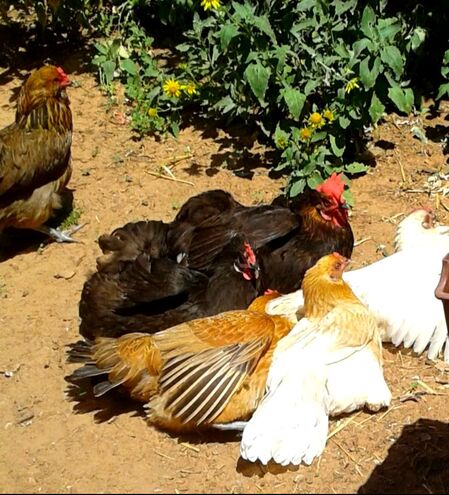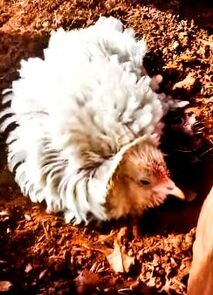The first time I seen one of my chickens stretched out in the dirt, laying perfectly still under the hot sun, many years ago, I thought my poor bird was dead but that was not the case. Fear gripped me as I approached my hen, then she suddenly started kicking dirt up into the air and letting it land all over herself. I thought she was dying and ran to pick her up.
After inspecting her. I could find nothing wrong, so I set my (now very upset) hen back down, only to see her dive back into the dirt and splash around in it as if she were taking a bath. I wondered if something was wrong with her and right away I checked all my chicken care books and searched on the internet to find out why my birds were obviously bathing in dirt. To my surprise, it turns out, dust bathing is quite common among chickens and for good reasons.
After inspecting her. I could find nothing wrong, so I set my (now very upset) hen back down, only to see her dive back into the dirt and splash around in it as if she were taking a bath. I wondered if something was wrong with her and right away I checked all my chicken care books and searched on the internet to find out why my birds were obviously bathing in dirt. To my surprise, it turns out, dust bathing is quite common among chickens and for good reasons.
Reason's why chickens take dust baths

My chickens taking a group dirt bath. CHOE.
Chickens take dust baths because it is their way of cleaning their feathers, keeping parasites off of themselves, healing themselves, and getting cool in the summer by digging down into cooler dirt. Dust bathing helps remove excess oils and helps your birds feathers to grow, prevents ingrown feathers, heals some skin conditions, and prevents some bacterial fungal infections. When a chicken dust bathes they seem to really enjoy the process of kicking dirt up in the air so it will land on themselves. Chickens bathing in the dirt is very interesting to watch too. It is not uncommon for several chickens to dust bathe together as you can see from the photo.Chickens have a natural instinct to dust bathe. Providing fresh loose dirt, ash, and sand for your birds allows this process to clean their skin and feathers while helping, to keep them from getting mites and lice. Mites attach themselves to feathers and burrow into the chickens flesh causing sickness, soft shelled eggs, and even death in severe cases. Dust bathing in freshly turned soil will prevent mites from attaching themselves to your chickens. Make sure your birds have fresh loose dirt to bathe in.
When chickens are dust bathing they will roll around in the dirt kicking it up over their bodies. The dirt attaches itself to the oil on their feathers and skin and absorbs it. Some birds will lay on their sides and spread one wing out while holding their legs stretched out as if they are sunbathing at the beach. When the chicken gets up they will shake the dirt off, leaving their feathers looking shiny and new.
Best dirt for dust bathing
Fresh turned or tilled soil is an important part of keeping chickens clean with less chances for mites to develop nests in their feathers or skin. If your hens have a favorite place to dust bathe or if you have a designated place for them to dust bathe you can sprinkle some Foodgrade DE into that area to aid in mite and lice prevention too. If your chickens are kept in an enclosed coop you can use an old tire and fill it with clean top soil and use a kitty litter scooper to scoop out any feces. (Change the top soil regularly). Tip: Add hardwood ash to your chickens dirt bath area to help keep mites and lice away. Check out my tiny hen taking her first dirt bath below.
When chickens are dust bathing they will roll around in the dirt kicking it up over their bodies. The dirt attaches itself to the oil on their feathers and skin and absorbs it. Some birds will lay on their sides and spread one wing out while holding their legs stretched out as if they are sunbathing at the beach. When the chicken gets up they will shake the dirt off, leaving their feathers looking shiny and new.
Best dirt for dust bathing
Fresh turned or tilled soil is an important part of keeping chickens clean with less chances for mites to develop nests in their feathers or skin. If your hens have a favorite place to dust bathe or if you have a designated place for them to dust bathe you can sprinkle some Foodgrade DE into that area to aid in mite and lice prevention too. If your chickens are kept in an enclosed coop you can use an old tire and fill it with clean top soil and use a kitty litter scooper to scoop out any feces. (Change the top soil regularly). Tip: Add hardwood ash to your chickens dirt bath area to help keep mites and lice away. Check out my tiny hen taking her first dirt bath below.
Lil' Snowball (Our Sweet Frizzle hen) takes her first dust bath
 Lil' Snowball my first white Frizzle chick loving her first dust bath. CHOE. 2018
Lil' Snowball my first white Frizzle chick loving her first dust bath. CHOE. 2018
Lil' Snowball is the very first white Frizzle chick hatched at Chicken Heaven On Earth sanctuary so I was a bit protective of her and kept her indoors a lot...too much and as a result the little sweetheart had never had a dirt bath, became pale from being indoors too much. I decided it is time to introduce her to the big outdoors and here she is with her friends Mr. Sweet Pea, Bonnie, and Red totally loving her first dirt bath. She will be getting lots more outdoor time now that I have seen how much she loves it. (See video below).
Do Chickens Need Water Baths?
Chickens do not usually need water baths unless they are very dirty, have mites or other parasites, do not have access to fresh dirt for dust bathing or if they have feces build up on the vent or tail feathers which could indicate problems such as sickness or parasites. Hen's who are egg bound do need to be water bathed in order to help relieve pain and slow bacterial infections.
If your chickens have a crusty buildup on their vent area, you can bathe them in warm water, using regular shampoo with conditioner but being extra careful not to get soap on their face, in the eyes, nostrils or mouth, rinse your bird well, and pat dry, then wrap them in a warm towel and keep them by a heat source until they dry completely. You can comb their feather's gently to help them dry faster. It is not advisable to use a hair dryer to dry their feather's as you could easily burn their tender skin or "cook" their internal organs, some of which are just below the surface of their skin.
Chickens do not usually need water baths unless they are very dirty, have mites or other parasites, do not have access to fresh dirt for dust bathing or if they have feces build up on the vent or tail feathers which could indicate problems such as sickness or parasites. Hen's who are egg bound do need to be water bathed in order to help relieve pain and slow bacterial infections.
If your chickens have a crusty buildup on their vent area, you can bathe them in warm water, using regular shampoo with conditioner but being extra careful not to get soap on their face, in the eyes, nostrils or mouth, rinse your bird well, and pat dry, then wrap them in a warm towel and keep them by a heat source until they dry completely. You can comb their feather's gently to help them dry faster. It is not advisable to use a hair dryer to dry their feather's as you could easily burn their tender skin or "cook" their internal organs, some of which are just below the surface of their skin.

